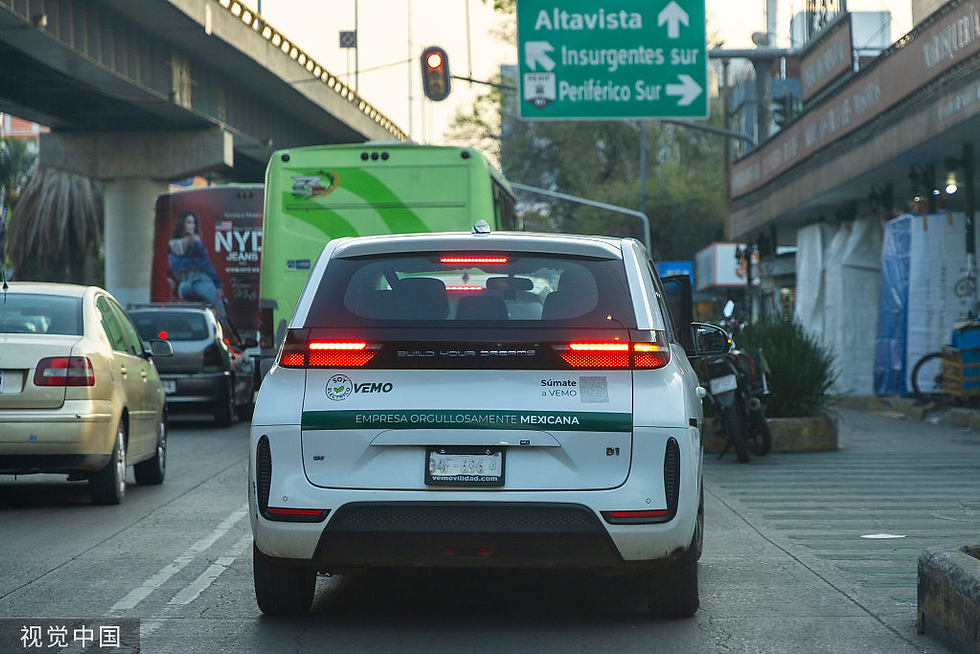The Mexican government will keep its distance from Chinese car companies and no incentives such as cheap public land or tax breaks will be provided.
Currently, Chinese-branded cars account for nearly one-third of total sales in Mexico.
The last meeting between senior Mexican officials and a Chinese automaker, BYD, was in January of this year.
BYD D1 electric car operated by Vemo Taxi in Mexico City, Mexico, Nov. 20, 2023 Photo credit: Visual China
Mexican officials reportedly made it clear during this meeting that they would not provide incentives to the car companies as they have done in the past and that they would suspend any future meetings with Chinese car companies.
The three Mexican officials believe that this move by the Mexican government is due to pressure from the U.S. government, particularly the Office of the U.S. Trade Representative (USTR), which has called for Chinese automakers to be excluded from free trade under the "U.S.-Mexico-Canada Agreement" (referred to as the "U.S.-Mexico-Canada Agreement"), established by the U.S. government. "(U.S.-Mexico-Canada Agreement).
According to Reuters, a Mexican official said that although Chinese investment may help the local economy, the Mexican government is concerned about this in future discussions on revising the "U.S.-Mexico-Canada Agreement."
Under the "sunset clause," the United States, Mexico and Canada will decide in July 2026 whether to extend the agreement for another 16 years.
The Mexican presidential office, BYD and the Chinese Embassy in Mexico did not immediately respond to requests for comment on the news, and the Mexican Ministry of Economy also declined to comment.
As Latin America's second-largest economy due to its proximity to the U.S. market and as a member of the U.S.-Mexico-Canada Agreement (USMCA), as well as its membership in the Comprehensive and Progressive Trans-Pacific Partnership (CPTPP), a number of tariff and quota preferences have made Mexico a hot spot for foreign investment in Latin America.
The Financial Times has previously pointed out that, with the United States trying to compete with China for supremacy in the field of electric car production, Mexico is at the extreme end of the U.S.-China trade dispute.
In recent years, Chinese car companies have experienced astronomical growth in Mexico. According to Reuters, today Chinese-branded cars are even more than a third of total Mexican car sales, but only in 2017 this number was still almost zero.
The Associated Press has previously pointed out that the United States is Mexico's top trading partner, but Chinese capital is becoming Mexico's fastest-growing source of foreign investment.
Currently, there are about 20 Chinese automakers that sell cars in Mexico but have not yet opened factories in the country.
According to the Financial Times, in December last year, SAIC MG (MG), BYD and Chery Automobile, three Chinese car companies, were in talks with Mexican officials to locate factories, of which MG is preparing to build a factory with investments reaching a total of US$1.5 billion to US$2 billion, while BYD's first phase of factory investment will be in the hundreds of millions of U.S. dollars.
Comparison of car sales in Mexico by each country. Bloomberg Photo
According to sources familiar with the matter, U.S. officials raised "concerns" about investments by Chinese companies during meetings with Mexican officials at the time. Mexican officials admitted that they had to be cautious about considering Chinese investments because of the risk of irritating the United States.
Early last month, in the U.S., Republican Senator Rubio proposed a substantial increase in tariffs on imported Chinese cars. Two days later, three Senate Democrats from auto-producing states also wrote a letter urging the same, and one of them, Democratic Senator Sherrod Brown (Sherrod Brown), subsequently turned up the heat, calling on President Joe Biden to completely block Chinese electric cars from entering the U.S. market.
At the same time, U.S. presidential candidates from both parties are stepping up on economic policy toward China.
Just on the 17th, Biden announced that he would reverse the current steel and aluminum tariffs applied to China, raising them to three times the current level, and that he would work further with Mexico to ensure that companies from China and other countries could not circumvent the tariffs by sending steel and aluminum products through a borrowed third country.
Trump has already threatened to consider a 60 percent tariff on all Chinese imports and a 100 percent tariff on cars made in Mexico by Chinese companies if he wins the election.



Comments